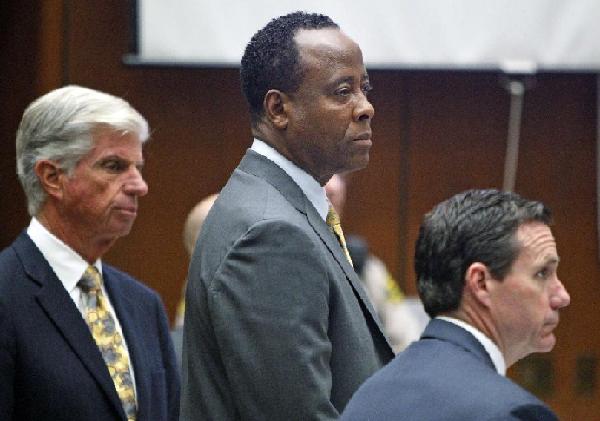Medical experts blame Michael Jackson's personal physician for his death
 0 Comment(s)
0 Comment(s) Print
Print E-mail
Xinhua, October 13, 2011
E-mail
Xinhua, October 13, 2011
|
|
|
Dr. Conrad Murray (L) looks on during Murray's trial in the death of pop star Michael Jackson in Los Angeles September 28, 2011.(Xinhua/Reuters Photo) |
Medical specialists on Wednesday blamed late pop star Michael Jackson's personal physician, Conrad Murray, for his death.
In an involuntary trial stemming from Jackson's death in Los Angeles, the experts accused Murray of allegedly administering powerful anesthetic Propofol on the superstar, leaving him unattended and delaying the vital assistance by professionals.
During their testimony, Dr. Alon Steinbeg and Dr. Nader Kamanger -- both of whom reviewed Murray's treatment of Jackson for the California Medical Board -- said Murray's actions violated multiple standards of patient care in his care of the pop superstar, primarily by giving Jackson Propofol in an unmonitored home setting.
Outlining six extreme deviations in standards of care he believes Murray committed, Steinberg, a Ventura County, California cardiologist, said Murray used the powerful anesthetic unnecessarily, failed to prepare for an emergency, follow emergency procedures or summon help immediately. He also asserted that Murray had failed to maintain proper medical records in the case.
There appeared to be a "significant delay" of more than 20 minutes before Murray called for an ambulance, Steinberg contended. For every minute Jackson was left unattended by emergency personnel, there was a "less and less chance" of the singer's survival, he said.
The deviations in standard care directly impacted Jackson's death, the expert concluded,
"If all these deviations hadn't happened, Mr. Jackson would've been alive" today, he said.
Kamanger, a pulmonary and critical care doctor who specializes in sleep medicine, also leveled criticism at Murray, calling his use of Propofol "inconceivable," "unethical," and "disturbing." He also said that Murray's actions -- and in some cases, inactions -- played a causal role in Jackson's death.
Earlier, Murray's attorneys announced that they would drop the argument that Jackson had orally administered the fatal dose of Propofol to himself when Murray left the bedroom in a surprise move.
J. Michael Flanagan, an attorney for Murray, told Los Angeles Superior Court Judge Michael Pastor that the defense had commissioned a report that determined swallowing the powerful anesthetic proof would not be fatal.
"We are not (going to) assert at any point in time that Michael Jackson orally ingested Propofol," Flanagan told the judge outside the jury's presence.
Prosecutors seek to prove Murray, 58, failed to properly monitor Jackson after giving him a lethal dose of Propofol. They contended that the cardiologist "repeatedly acted with gross negligence, repeatedly denied appropriate care to his patient, Michael Jackson, and that it was Dr. Murray's repeated incompetence and unskilled acts that led to Mr. Jackson's death on June 25, 2009."
Defense attorneys argued Murray was weaning Jackson off the medication, but the singer "self-administered" an extra lethal dose. The cardiologist was hired by Jackson to care for him two months before his death.
The trial is expected to last four to five weeks. Murray, who is set free on a bail of 75,000 U.S. dollars, faces up to four years in prison and the loss of his medical licenses if convicted of the felony charge.






